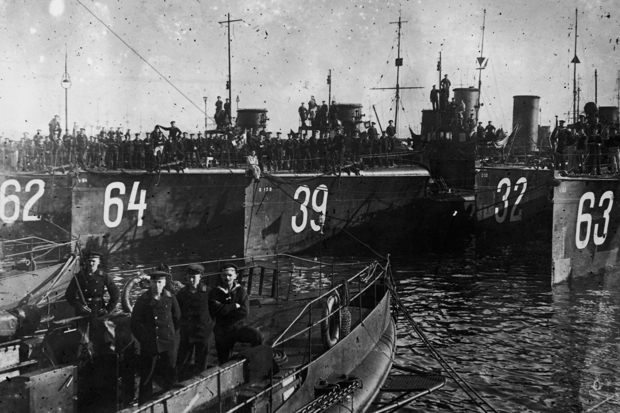From ‘Topics of the Day’, The Spectator, 8 August 1914:
‘How does it happen that within a week Germany and Austria-Hungary are at war with France, with Russia, with Britain, with Servia, with Belgium, and that it is exceedingly likely that to the list will have to be added Holland, Switzerland, and Denmark, and later Italy, Roumania and Greece?
‘…Our answer is one which we feel bound to give because we believe it, even though it may seem to a section of our readers unjust to Germany. We believe Germany made the war, and made it because she feared that unless war came now she might have to give up her strongest national aspiration – the aspiration to be a great world-Power, dominant in Europe, with vast dependencies abroad, and able to command the sea, or at any rate to be possessed of naval strength greater than that of every other Power but Britain, with the certain prospect of equaling Britain in the future, and of developing eventually into the pre-dominant naval State. That is Germany’s aspiration, that is what she thinks it worth while to have set the world in flames to get. For, remember, she does not think, as most people here do, that she is running too terrible a risk to make such conduct sound. Rightly or wrongly, Germany believes that she has the strength, if she acts at the proper moment, and if her people are ready and willing, as doubtless they are, to make the necessary sacrifices to fulfill her dream of world-power.
‘But why did she think the present so favourable a moment? We believe that some feeling – we will not call it panic, because that suggests cowardice, and the Germans are a very gallant race – seized her as to the magnificence of the opportunity offered by the existing state of Europe. She though the situation was going to develop unfavourably in the future, and that she, in fact, was now on the crest of the wave. What made her think this? In the first place, and we believe that this has all along played an enormously important part, there was the opening of the Kiel Canal. A month ago that canal was finished. There has always been an undercurrent of feeling in Germany that the moment the canal was made deep enough and wide enough to take Germany’s war fleet she would have gained am incalculable advantage both as regards Russia and as regards Britain. People here may be inclined to think this is an exaggeration, but, at any rate, we are sure that the Germans believe they have an enormous advantage in the canal. The next consideration was the belief that England was on the verge of civil war, and therefore that her neutrality was almost certainly assured. Again, there was the belief, encouraged by the disclosures in the French Senate, that France was at that moment very badly prepared for war. Lastly, there was the very potent impression that Russia was every day getting stronger, and that if Germany waited for another three years the advantages just named might be obliterated by vast increases in the Russian armaments, and especially in the development of her strategic railways. To put the thing in another way, we believe that the real cause of the war was that Germany was seized by one of those impulses which are prompted by the thought of “Now or never!” – impulses which are the most frequent cause of war. War is so a terrible thing, the risks are so awful, and so pessimistic are most statesmen as to the possibilities of maintaining peace, that those of them who have been trained in the school of Realpolitik would hold it a crime not to strike whenever they were convinced that their nation had a preponderance of power. To lose the golden opportunity seems in their eyes as wrong as suicide seems to the individual.’






Comments